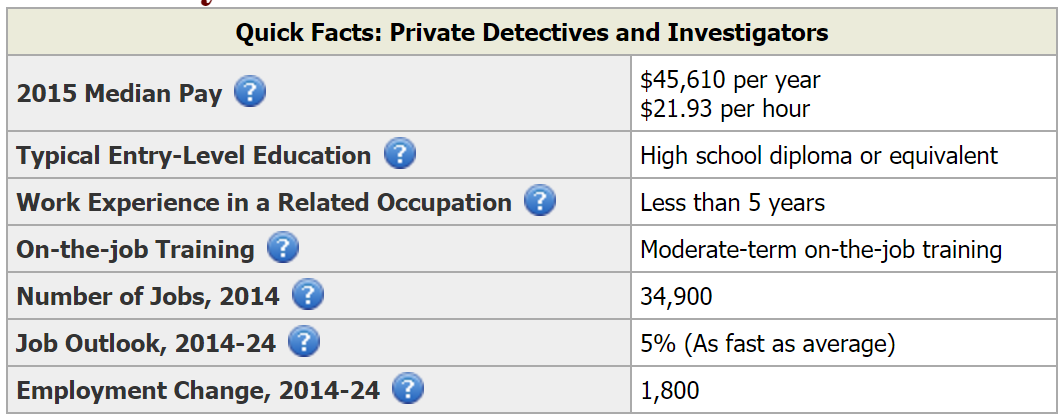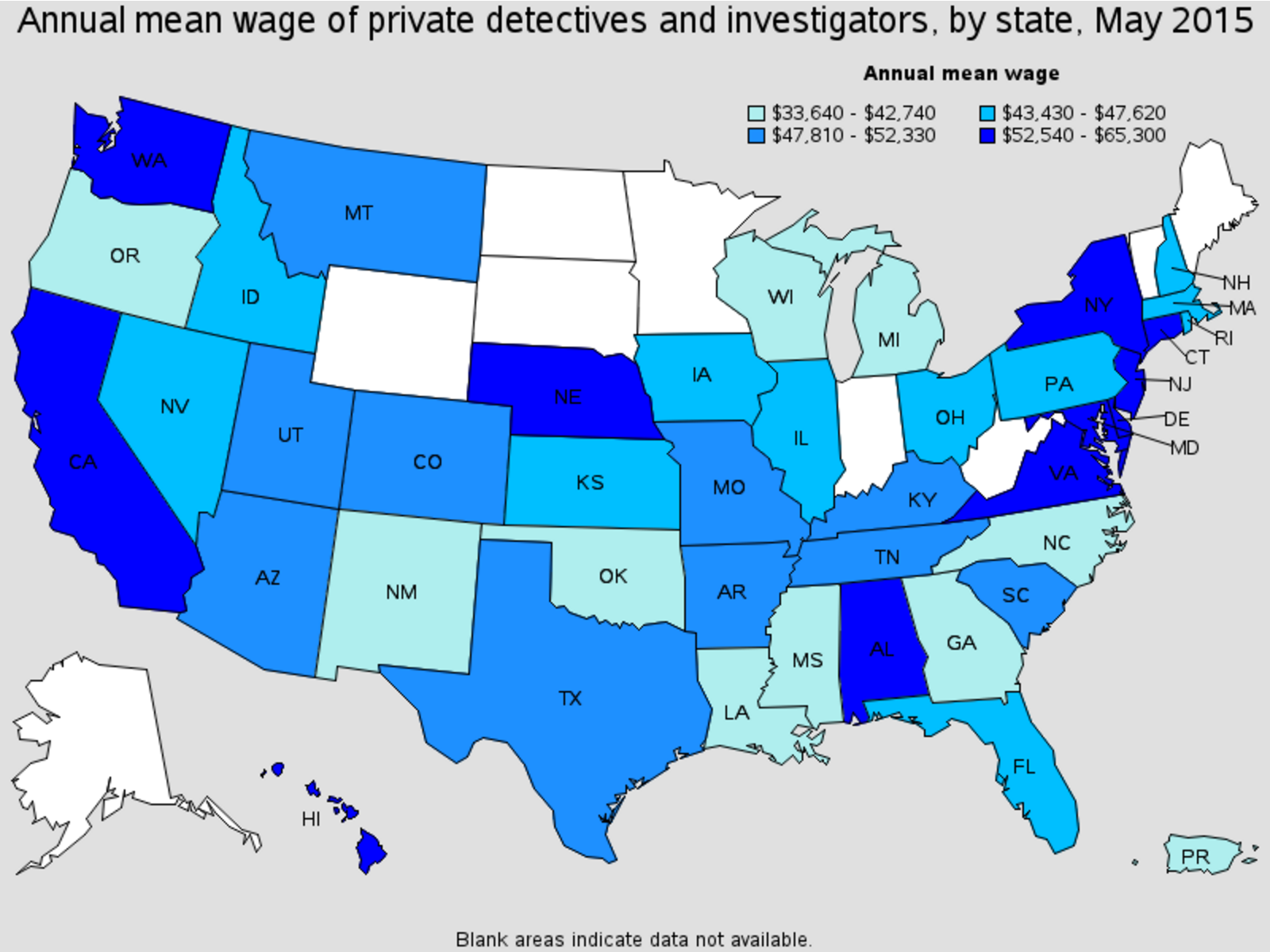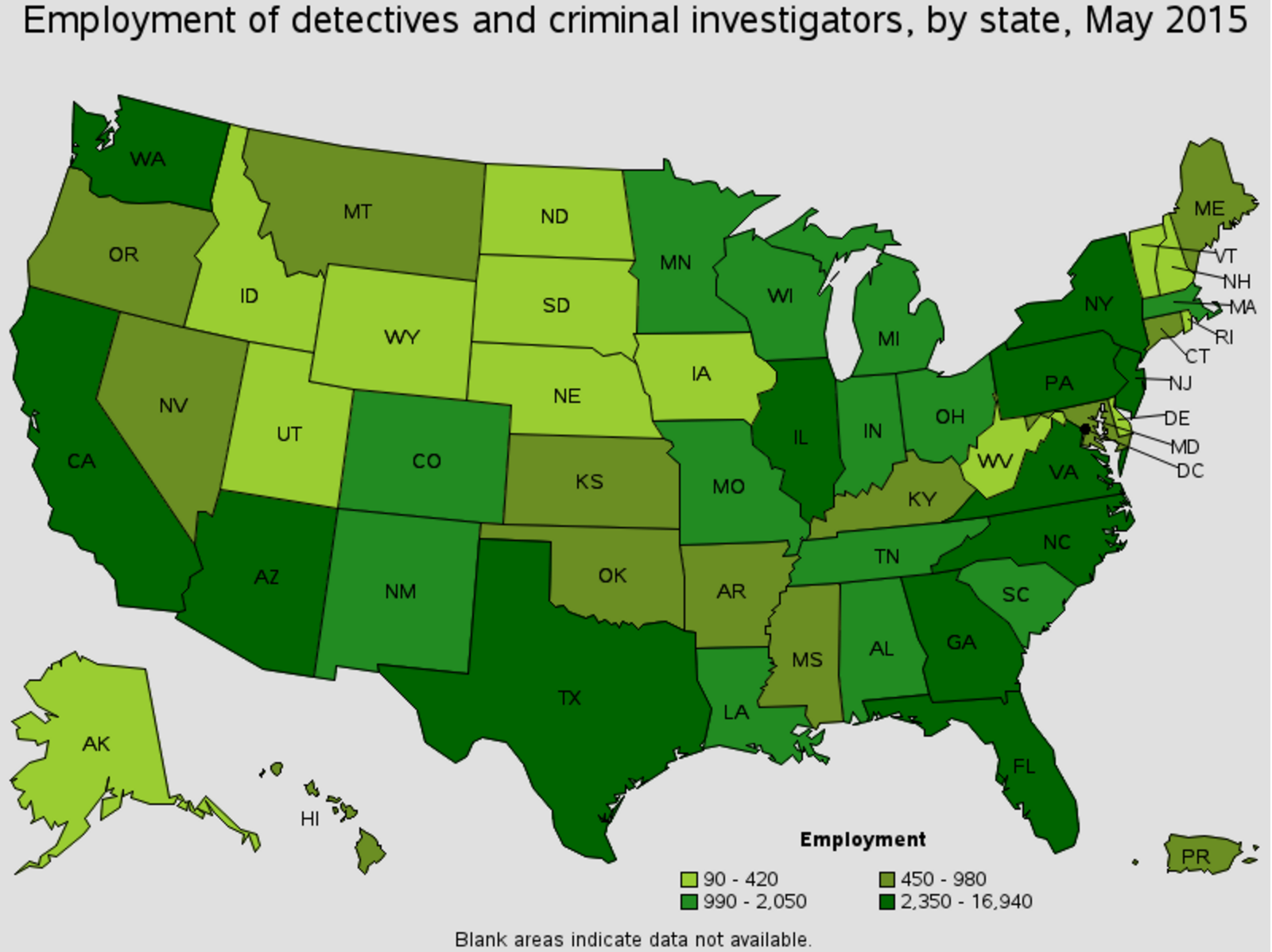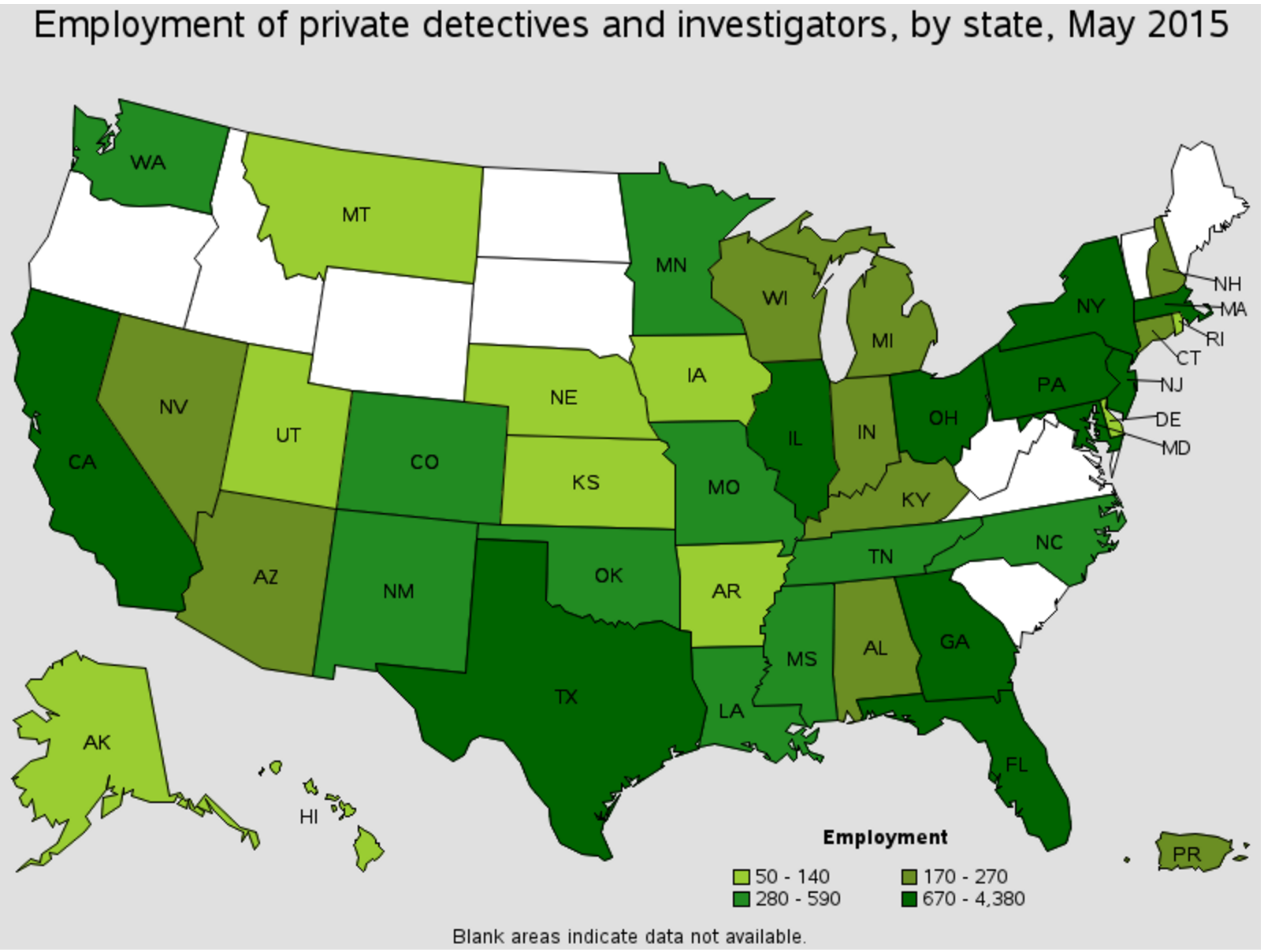Becoming a detective is a dream for those who grow up watching detective and serial movies. After knowing the character of Sherlock Holmes, we assume to be like him. However, somewhere along the way, we forget this dream of ours and work towards more “realistic” goals. In recent years, due to the increased rate of crime, there is a greater need for detectives to solve them. This is the reason why some police officers are trying to be like Sherlock Holmes. For those of you who still haven’t given up on your detective dreams, here is some information on the exciting career of being a detective.


Table Of Contents
- Average Detective Salary
- Detective Career Outlook
- How To Become A Detective
- Detective Job Description
How Much a Detective Earns
The employer is the one who will decide regarding the detective’s salary. Usually, a state employed investigator has higher earnings compared to a private one. This is because a private detective has intermittent work while the state employed has a steady work. A state employed detective earns a national average of $76,000. For a private detective, he or she can earn about $45,000. We shall discuss factors affecting a PI’s salary later. For now, let us look at the factors that affect the salary of state employed investigators.
[asd_program_button /]Population Size
Just like police officers, the income of a detective is dependent on the city’s population. A more populated city will mean more cases to be handled. Thus, the increase in salary. The crime rate also affects the salary of an investigator. For example, the average salary for someone in the LA police department ranges from $44,000 to $88,000. In contrast, for someone in Miami Police department, the average salary tends to be around $86,000 to $107,000.

Job location
Crime rate and population of the place are closely related to the location. However, cost of living is another factor to consider. A detective will be paid higher if the cost of living in that certain location is higher. Private investigators will also have this case. A pay of $116,00 is usually received by employees in District of Columbia, Alaska and New Jersey.
Level of education attained
For any police job (except at the federal level), a high school degree is sufficient. Though this rules sometimes varies with state, most states do not require higher education certificates. However, some states and departments have started to realize the importance of higher education and thus are paying officers and detectives a percentage higher above the base pay if they have a degree after high school. This may be an associate’s, bachelor’s or even a master’s degree. You will be paid more depending on your degree.
Work Experience
You will be paid as an investigator if you will be working in the field for a long period of time. Usually, people see an increase of up to $15,000 with 20 years of experience if they do not get promoted. However, with promotions, if you reach the post of Police Chief, you can earn about $180,000 annually.
Cedaredge Private Investigators
A private investigator’s salary depends on the number of cases he or she takes and solves. The location, amount of discretion needed, amount of danger involved, required extra equipment and other many things are the factors mentioned above that can affect the price. Clients usually present their problem to the investigator and then it is up to them to quote a price for the job.

A state-employed detective has a steady income that will increase by various means as described here. On the hand, the salary of a private investigator is quite unpredictable and can only be increased by fame (or rather being more discrete). The path to choose will be determined based in the financial facts you have.
Cedaredge Detective Career Outlook
What we are going to talk about first is the growth in the fields. There were about 106,000 public detectives or criminal investigators recorded in 2015. On the other hand, there were only about 30,000 private investigators holding a job at the same time. Private detectives have grown for about 5% in the industry. Meaning to say, in 2025 the new jobs open will reach 1,500. Such growth rate follows the 5% average growth rate in all other sectors. On the other hand, for public investigators, this figure is at 4%. This goes to show that 4,000 more jobs as a criminal investigator is expected in 2025. This can be considered as an average rate of growth as well.
[asd_program_button /]The employment increases steadily because the population increases. As the population increases, more people need to be protected and more criminals need to be caught. But due to the strict implementation of laws and technology are more advanced, the crime rate is not increasing that much. Hence, there is a balance in each other, which leads to average growth in both careers.

The highest number of Criminal/Law Enforcement Investigators are found in Texas, California and New York. There are more employments in Western states and Texas compared to the eastern part. Private detectives in California, Texas and Florida with the southern part are higher in number compared to the northern ones.
Let’s now find out where these two professionals are hired most by industires. Criminalinvestigaors are being hired mostly by The Local, State government and the Federal branch. On the other hand, private detectives are usually hired by Security Services, Consulting services and occasionally by the local government for consultation on a few cases.
Financially speaking, criminal investigators do get paid more than private ones. The annual average salary of criminal investigators is $80,000 while Private investigators get $52,000. When you combine the aspects of geography and finance, you see that District of Columbia, Alaska, and New Jersey paid the most (6 figure salaries) for Public investigators. Private detectives receive higher payment in Alabama, Nebraska, and New Jersey.
Comparing with different industries again, we see that for private industries, the most employing industries do not pay the highest. Private detectives are paid most in Electromedical, Navigational, Power generation, Metal Product forming and other such industries because of the most sensitive information that needs to be protected. For public investigators, they are paid most by federal agencies, postal services, and educational institutes.

How To Become A Cedaredge Detective
Detectives come in two kinds. Some of them are private investigators who can be hired by the general public to investigate on certain things. The others are employed by the government and reach this post after being promoted from a police officer. We are going to explore here the different avenues.
[asd_program_button /]Complete High School
A detective is generally a police officer who has been promoted to that position because of his or her skills of deduction. Hence if you want to become a detective, it is generally necessary to graduate from high school and enlist in the police force. To become a private investigator, a high school degree is a must too.
Get Yourself a Bachelor’s Degree
In most cases, enlisting in the police force won’t require a bachelor’s degree. Some officers however want to have another source of income right after they retire from their job. However, if you aspire to be a detective or land a job on federal level, you will need a bachelor’s degree.
Many institutions require applicants to have a bachelor’s degree in law, criminal justice or psychology to become a detective. Anyone with an associate’s degree is given training up to 5000 hours. But for someone with a bachelor’s degree, the required training is only 4000 hours.
Gain experience
To become a professional detective (not employed by the state), you need to have some professional experience as an investigator. You can find several ways to do so. However, the most common way is to be employed by the government first. You will be regarded as a person with experience if you worked as a criminal investigator or an arson investigator. Working as an office investigator or as a licensed repossessor will count as well.
The experience required might vary from one state to another. A state might require at least 3 years of experience, but in some it could be as long as 5 years.
Acquire a license for your guns
Investigators who don’t have a firearms permit are prohibited from carrying their guns. There are several firearms with strict requirements such as completing a full training course before the permits are issued. Therefore if you want to own a firearm while working as an investigator, completing the training course is necessary to get your own permit.
Obtain Colorado licensure
After completing all the education and experience requirements, you are required to undergo a state licensing test. The test will include questions regarded state laws and have multiple choices to choose from. The test is only available for those who want to be private detectives. Once you pass, you will officially become a licensed private detective.
File for Colorado insurance
Since investigating can sometimes be a dangerous line of work, it is important to get insurance done. Typically, we’re talking about a $10,000 medical insurance. But since you’re carrying a gun with you for extra protection, and you will have to insure the gun as well, getting a higher amount will be an ideal choice.
By completing these steps, you’ll be good to go. You can finally fulfill your dream and become a detective! Keep in mind however that there are dangers associated with this line of work. If you are still up for it, find out all the education requirements in detail and get started on them right away!
Responsibilities of Being a Detective in Cedaredge
Crime Scene Investigation
One of the main duties of a detective is to analyze a crime scene and deduce certain assumptions from it. The detectives find and bag evidence at the scene of the crime. They are supposed to take anything into custody that may look suspicious and may be used for clues or in the court later. In some cases, detectives can receive aid from the forensic investigation department, hence allowing them to come up with more deductions regarding the crime. Detectives should gather as many clues and evidences as possible by analyzing cameras and gathering information from eye witnesses.
[asd_program_button /]Criminal Research
An important aspect of a detective’s duties is to research previous case files in their free time. They do so to gain more knowledge about criminal behavior and identify patterns that people usually follow. Often, research into the past and previous case files give them an idea or a clue as to how the current culprit might be operating. In cases of serial killers or ‘copycats’, research helps a lot. This is also applicable when it comes to knowing what tactics a drug cartel is up to. Research also helps detectives make deductions more efficiently.
Narrowing down suspects
The goal of a detective’s job is to bring justice to light and bring the culprit to justice. They will need to have a list of the suspects first before such thing could happen. The list could be long, including up to a hundred people, or short – sometimes none at al. With the help of evidence, research, statements, and forensic studies, they are able to come up with such list. This suspect pool is then narrowed down by getting alibis from some suspects and interrogating others. After they narrow it down as much as possible, they collect hard evidence or get the suspect to confess to the crimes.
Testifying In Court
Lastly, detectives will see to it that justice is served properly. To help with the process, they are sometimes summoned to the court to testify against the suspect(s). They will often describe the scenario of the crime, and present evidences that will prove the crimes of the criminal. In some cases, they will even accompany the culprit to the jail.
Cedaredge Private Detectives
All the above duties were that of a public detective or a law enforcement detective. Keep in mind that the job of a private detective isn’t as easy as it seems. They will need to fulfill the needs of their clients especially when it comes to research. But there are limits which they shouldn’t go beyond when carrying out their duties. Private detectives are often hired for tasks such as gathering evidence from someone, monitoring certain individuals, or even tracking finances. They should never act in a way that they can be easily recognized as a detective in public. Moreover, arresting someone is out of their jurisdiction.
Basically, you can see that the television has been portraying detectives properly for the most part. The thing is, the duties and roles detectives undertake every single day are very stressful. They are never displayed on portrayed on the media or anywhere else. Detectives should make sure to find any clue they could get since a lot of people’s lives lie on them. If you’re really interested with the job, you should start knowing what it takes to be a detective now!
